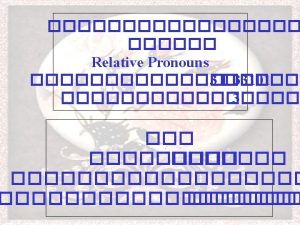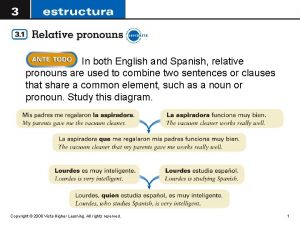Latin IIIII Week 4 Relative Pronouns used to























- Slides: 23

Latin II/III Week 4

Relative Pronouns used to relate to/ refer to some preceding word (antecedent) the relative pronoun must agree with the antecedent in gender and number, but it takes the case for the clause it is used in. English relative pronouns are expressed by: who, which, what, and that

Relative Clauses The use of relative pronouns is to usually combine 2 related sentences. ex) I watched the rugby game. The rugby game was on the TV. >>>>>> I watched the rugby game that was on the TV. In the one sentence you get a main sentence and a relative clause

practice ex) Est regina quae in Africa habitavit. She is the queen who lived in Africa. quae is feminine singular to agree with its antecedent regina, but quae is nominative since it is the subject of habitavit.

Declension of Relative Pronoun Singular plural m. f. n. m. f n. nom quī quae quod quī quae gen cuius quōrum quarum quōrum dat cuī cuī quibus acc quem quam quod quōs quās quōs abl quō quā quō quibus quī, quae, quod - who, which

intensive adjective (can also be used as pronouns) Singular plural m. f. n. m. f n. nom ipse ipsa ipsum ipsī ipsae ipsa gen ipsius ipsōrum ipsārum ipsōrum dat ipsīs ipsīs acc ipsum ipsam ipsum ipsōs ipsās ipsa abl ipsō ipsā ipsō ipsīs ipse, ipsa, ipsum - himself, herself, itself

Ablative of Accompaniment When relative pronoun is used with cum, it is attached to the end of the pronoun ex) Vir quocum ambulabam erat altus. The man with whom I was walking was tall.

Vocab qui, quae, quod - who, which, that lux, lucis f. – light do, dare, dedi, datus – to give inter (+acc) – between, among

Colosseum http: //www. history. com/videos/coliseumdeconstructed#coliseum-deconstructed


Colosseum originally called the Flavian Amphitheatre, after the Flavian dynasty of Emperors including Vespasian, Titus and Domitian. Built for the Roman citizens, entrance to the games were free Used to please the citizens and keep them entertained the area covers 6 acres, less than 10 years to build. (72 -80 CE)

Games/Events Gladiator fights, recreations of famous battles (land sea), etc. There were over 20 different types of Gladiators The wild and exotic animals which included lions, tigers, hyenas, hippos, rhino's, crocodiles, ostriches, antelopes, bears and zebras An estimated 700, 000 people died in the bloody arena.



A Retractable Awning called the Velarium provided cover and shade. Brackets supported 240 wooden masts on which canvas awnings were hung.








Translate Ludos et pompas populus Romanus magno studio spectabat. In Italia, in Africa, in Gallia conservantur theatra et amphitheatra Romanorum, in quibus ludi etiam nunc habentur. Natura virorum varia est sed pauci ludos non amant. Captivi et servi mali quos domini in amphitheatrum miserant in media arena pugnare cogebantur. Populus Romanus studium ludorum numquam intermisit. Multa captivi cum magno animo pugnabant et libertatem obtinebant. Multi mali viri etiam pro vita pugnabant et poenam in arena sustinebant.
 Relative clauses and relative pronouns stage 15
Relative clauses and relative pronouns stage 15 The person who phoned me last night is my teacher.
The person who phoned me last night is my teacher. Examples of relative adverbs
Examples of relative adverbs Relative pronoun as possessive
Relative pronoun as possessive Demonstrative pronouns and interrogative pronouns
Demonstrative pronouns and interrogative pronouns Pronouns in english
Pronouns in english Latin relative clauses
Latin relative clauses Decide whether the relative pronoun is correct or not.
Decide whether the relative pronoun is correct or not. Week by week plans for documenting children's development
Week by week plans for documenting children's development Pashto language words
Pashto language words Conditional frequencies
Conditional frequencies Who whose whom which
Who whose whom which Relative pronouns
Relative pronouns Reflexive and relative pronouns
Reflexive and relative pronouns Tipos de relative clauses
Tipos de relative clauses Onouns
Onouns Relativ pronouns
Relativ pronouns Combine these sentences using non-defining relative clauses
Combine these sentences using non-defining relative clauses Relative adverb
Relative adverb Kinds of pronouns
Kinds of pronouns Nominal relative clause
Nominal relative clause Relative pronouns german
Relative pronouns german Relative pronouns exercicios
Relative pronouns exercicios Adjective clause markers
Adjective clause markers










































